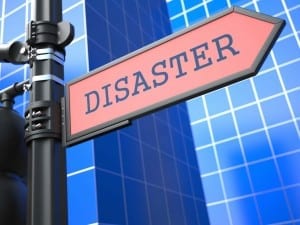Nothing can sink your small business faster than an unexpected disaster, so you need to be prepared. And disaster recovery preparation is easier than you think.

John Motazedi, CEO of SNC Squared – a business that was saved after a tornado thanks to its disaster recovery plan – recommends starting with a few things that would make it difficult to run your business if they were suddenly gone. Once you’ve figured out where you’re vulnerable, it should be pretty clear what you need to do to protect those assets and processes.
Planning for Disaster Records
Keep detailed records of all your business contacts so you can reach them in event of emergency. You may need backup office space, an emergency credit line, a cloud backup copy of your critical data – it might not take much to keep you going.
So take the time to think about what you absolutely need for your business to survive. It should tell you valuable things about your business regardless of whether you ever need that disaster recovery plan.
Adapted from How a Disaster Recovery Plan Can Save Your Business at Small Business Computing.
Read more on Planning for Disaster: http://business.time.com/2012/10/22/planning-for-disaster/#ixzz2A99YeXMW